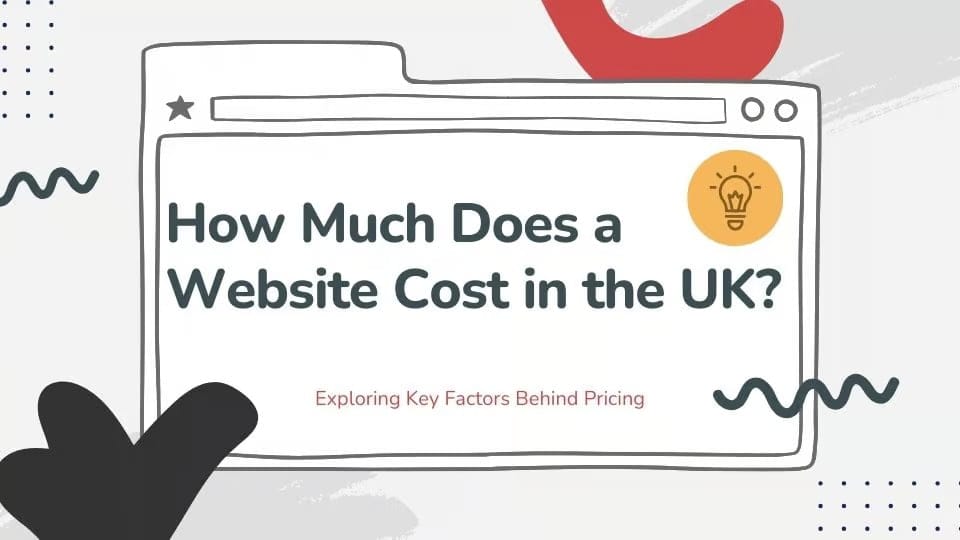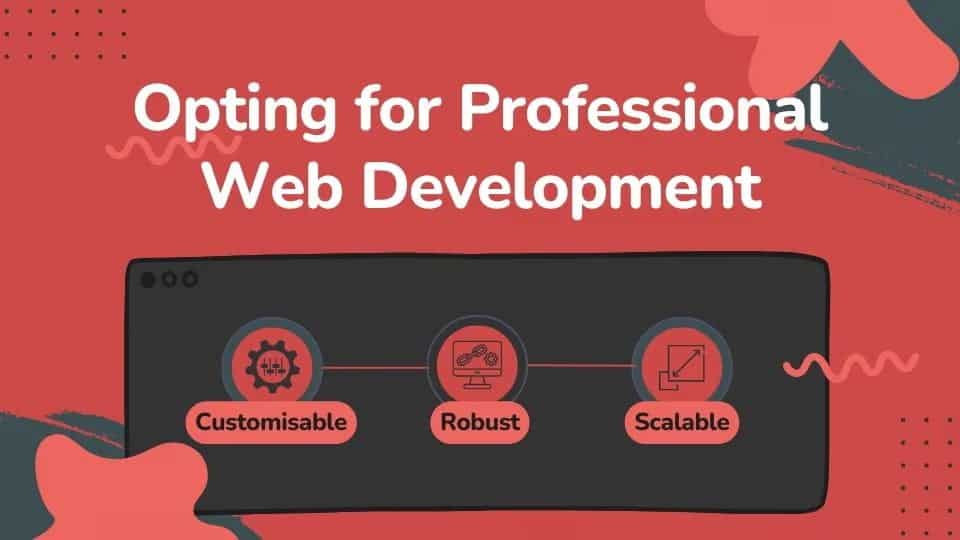Navigating the complexities of website pricing in the UK can often feel like a journey through uncharted digital waters. For business owners, understanding what goes into the cost of a new website is a fair consideration, yet the task is often shrouded in ambiguity.
How much does a website cost in the UK? We hear you. In this post, we’ll run through the various elements that influence the price of building and sustaining a website in the UK.
Our focus isn’t to pin down exact price tags — as these can vary widely — but to provide you with a clear understanding of the elements that influence pricing. Whether you’re considering an e-commerce platform, thinking over design options, or debating over hosting services, we’ll look to navigate the financial landscape of web development.
Ready? Let’s go…
Understanding the Types of Websites and Their Costs
When it comes to building a website in the UK, the spectrum of options ranges from DIY solutions to professionally crafted digital storefronts. Each option has its pros and cons (when it comes to cost). Here’s a breakdown:
DIY Websites

DIY websites, created through platforms like Wix, Squarespace, or godaddy, are a popular choice for many new businesses and those on a tight budget. We speak to quite a few small businesses and platforms like these are often ideal for those who are just starting out or simply need a basic online presence. This said, there’re a few things to bear in mind…
Professional Appearance and Initial Impressions
In today’s digital age, it’s almost expected for any reputable business to have an online presence. For those handing out business cards, including a web address is almost a given. A DIY website can serve this purpose well, providing a professional-looking online space where potential clients or customers can learn more about what your business offers.
Consideration of Time and Resources
However, a key trade-off with DIY websites is the investment of time. While they may appear cost-effective initially, the learning curve and time spent building the site can add up. Many new business owners we speak to at Akoca find that when they calculate the time spent learning and creating their website against their hourly rate, the cost can be higher than expected. Like anything DIY, it’s important to weigh the value of your time against the potential savings of a DIY approach.
Perception of DIY Websites
Perception of DIY Websites: Another consideration is the perception of DIY websites. Often, these sites include tell-tale signs of being self-made, such as ‘Powered by GoDaddy’ or similar footers. While this isn’t necessarily a problem for all, for some businesses, it can detract from the professionalism of their site.
Expected budget:
Monthly Costs:
For platforms like Wix, Squarespace, or GoDaddy, monthly costs start around £10-£20. Advanced features, like ecommerce or premium templates, can increase this to £20-£40.
Time Investment:
Creating and customising your website may take between 10 to 40 hours, depending on complexity and your proficiency. Ongoing updates and maintenance will also require a time commitment. Weigh these hours against other business activities to determine the best approach for your needs.
Free Website Options: A Closer Look Beyond the Allure

The attraction of free website options, often seen in social media promotions, can be tempting for startups or businesses with limited budgets. You might have come across offers like “Get your free website now!” While these proposals seem ideal for creating an online presence without initial financial outlay, it’s crucial to consider the whole picture based on real experiences.
While there are undoubtedly some genuine free website services out there, it’s wise to approach these offers with a degree of caution. Looking at this from our own experience and conversations with various business owners in our network, we have a few insights that could help you make a more informed decision.
Understanding the Reality Behind ‘Free’ Websites
Often, what starts as a free or low-cost offering can evolve into something more costly than anticipated.
Challenges with Support and Stability: A recurring narrative we’ve encountered involves businesses choosing low-cost website services, attracted by their affordability and simplicity. However, they then frequently encounter slow responses and inadequate support, especially when requesting additional features or customisations. Situations become critical when the service provider suddenly ceases operations, leaving businesses with unsupported and potentially obsolete websites.
Unforeseen Additional Costs: Another common scenario involves businesses lured by ads offering ‘free’ websites. Initially, the deal seems perfect, but hidden large costs soon emerge. Charges for basic additions, updates, and so-called SEO enhancements, which often fail to deliver tangible results, start piling up, leading to substantial and unplanned expenses.
Navigating the Terrain of ‘Free’ Website Services
These experiences highlight the need for careful consideration when it comes to ‘free’ website offers:
Research Thoroughly: Ensure the provider has a stable history and positive reviews. Understand the level of support offered and how it aligns with your business needs.
Be Wary of Hidden Costs: Be alert for additional charges for essential features and services that may not be included in the ‘free’ package.
Consider Long-Term Implications: Free services often come with design and functionality limitations. Before diving in, taking the time to assess if these constraints align with your long-term business objectives and growth strategies can save you down the road.
Expected budget:
Set up:
Small to Free
Other costs:
High
Professional Web Development: Tailoring to Your Business Needs

Moving beyond the realm of DIY and free options, professional web development is where businesses often turn for a customised, scalable, and robust online presence. This option involves hiring a web developer or an agency to create a website that is specifically designed to meet your business’s unique requirements and goals. Let’s look at what this involves and the potential costs:
Brochure Websites
These are digital equivalents of a physical brochure. Brochure websites provide basic information about your business, services, or products in a straightforward, easy-to-navigate format. Ideal for small businesses or sole traders who need a simple yet effective online presence.
Expected Budget
The price range for a brochure website can vary based on design complexity and content volume, starting from around £500 to £3000.
E-commerce Websites
Designed for online sales, these websites are more complex due to features like shopping carts, secure payment processing, and inventory management systems. They’re for businesses that sell physical (or digital) products or services online.
Expected Budget
For a basic e-commerce site, prices can start from £1,500 and can go up to £10,000 or more, depending on the number of products, custom functionalities, and integration requirements.
SEO-Optimised Websites
These websites are built with a focus on search engine rankings. Incorporating SEO best practices from the outset, they are designed to increase your online visibility and drive organic traffic.
Expected Budget
An SEO-optimised website will largely be dependant on the extra research, content creation, and technical adjustments required – It can add anything from 50-150% to the base cost of the website.
Large/Complex Websites
Suitable for larger businesses or those requiring advanced features like custom integrations, user portals, or complex database functionalities.
Expected Budget
The cost for large or complex websites can significantly vary, generally starting from £5,000 and can go well above £50,000 based on the project scope.
Custom-Coded Websites
When off-the-shelf solutions don’t meet the specific needs of a business, custom-coded websites come into play. These types of websites are built from the ground up, they often require extensive development work to create unique features, integrate complex systems, or cater to specific processes.
Expected Budget
Custom-coded websites are a significant investment, reflecting the bespoke nature of the development. Prices typically start from around £5,000 but can escalate depending on the complexity of the coding, the intricacy of features required, and the scope of the project. For very advanced sites with extensive customisation, costs can exceed £50,000.
Expected Budget for Professional Web Development
As you can see, the cost for professional web development varies greatly. In addition to investment in the website, there are the associated ongoing costs which cover aspects such as website maintenance, hosting, updates, reporting etc.
In essence, going down the professional website route offers a custom solution that, while potentially requiring a higher initial investment, can provide great value in the long run.
Summary: Decoding UK Website Design Costs for Small Businesses
In the diverse landscape of UK website design, costs can vary widely, depending on the type of site you’re aiming to create. Here’s an overviewof what we covered:
DIY Websites
These are budget-friendly options for new businesses, with monthly costs starting from around £10-£20. However, they require a time investment which, when considered against your hourly rate, might make them less cost-effective in the long run.
“Free” or “Lowcost” Website Options
Initially cost-free, these services can quickly accumulate hidden expenses for additional features and updates, often leading to higher long-term costs than anticipated.
Professional Websites
Ranging from £500.00 – £50,000 + the cost of a profesionall website depends entirely on a wide range of factors.
To finish off, we trust this post has given you a good overview as to what goes on behind the scenes of pricing for a website. In a nutshell, the average cost of website design for small businesses in the UK often depends on the type of site and its complexity.
If you’re considering a website for your business and would like to explore what route might work best for you within your budget & goals, feel free to get in touch.




0 Comments